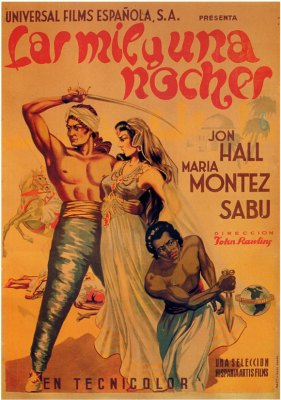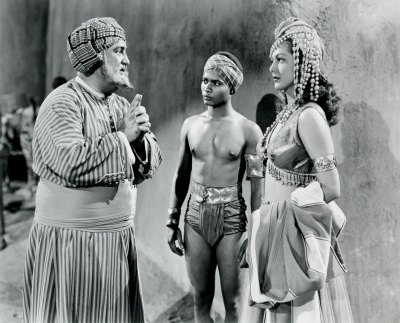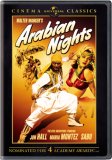| Reviews & Columns |
|
Reviews DVD TV on DVD Blu-ray 4K UHD International DVDs In Theaters Reviews by Studio Video Games Features Collector Series DVDs Easter Egg Database Interviews DVD Talk Radio Feature Articles Columns Anime Talk DVD Savant Horror DVDs The M.O.D. Squad Art House HD Talk Silent DVD
|
DVD Talk Forum |
|
|
| Resources |
|
DVD Price Search Customer Service #'s RCE Info Links |
|
Columns
|
|
|
Arabian Nights
Such is the case with Arabian Nights (1942), Universal's first production in three-strip Technicolor, which deservedly was nominated for an Academy Award. The film was an obvious but successful effort to cash in on the popularity of the 1940 British film The Thief of Bagdad; their scripts are almost identical in terms of structure, with the young Indian actor Sabu playing essentially the same role in both films.
Arabian Nights was a huge hit for Universal, and they teamed stars Jon Hall and Maria Montez in five more pictures together, two of which also feature Sabu. Decades later these films would find a cult audience that enjoyed them as high camp, especially for Montez's vampy scenery-chewing. But Arabian Nights is perfectly respectable, comparing favorably to the classic film that inspired its production. Though it lacks the fantasy elements (and superb visual special effects) of the British film and, typical of Universal's movies of the period, has its share of low-brow comedy, it's quite entertaining.
The story concerns the Caliph of Bagdad [sic], Haroun Al Raschid (Jon Hall) and his half-brother, Kamar Al Zaman (Leif Erickson), who in the film's backstory had tried to overthrow his brother because a dancing girl Kamar was obsessed with, power-hungry Scheherazade (Maria Montez), had promised to marry him if he were to become caliph. As the film opens, Kamar loyalists rescue their leader moments before his execution and seriously wound Haroun in the process. Acrobat and magician Ali Ben Ali (Sabu) rescues Haroun, hiding his identity from the other entertainers - including, as it turns out, dancer Scheherazade.
With Zaman in power, Scheherazade assumes she's got it made but plotting Grand Vizier Nadan (Edgar Barrier), concerned that Scheherazade will muck things up, has the captain of the guards (Turhan Bey) sell the entire troupe to slave-trader Hakim (Thomas Gomez). Can they escape? Will Scheherazade fall for Haroun? You bet.
Universal in the early-1940s was essentially a B-studio cranking out second features to support bigger films generally made by others, but Arabian Nights was a big step up for the company, and they lavished it with production values rare for Universal at that time. Though much of its look was achieved via flawless matte and glass shots, there are a number of lavish sets and it's obvious more time was accorded the production than the average Universal potboiler.
Beyond Universal's fine stock company of contract character players (Gomez, Barrier, Bey, etc.), one of the best things about Arabian Nights is that Ahmad's (Billy Gilbert) endearing troupe is comprised of deglamorized characters from The Book of One Thousand and One Nights. Besides Sabu's Ali, the offbeat but amusing casting has Shemp Howard (of the Three Stooges) playing Sinbad the Sailor, who bores other members of the troupe with endless tales of his various voyages ("No tales, Sinbad," complains Gilbert, "Work!"); and John Qualen (The Grapes of Wrath, The Searchers) as a down-on-his-luck Aladdin, whose lamp never quite works. (Wrestler William "Wee Willie" Davis also turns up as the hulking strongman.) This odd composition of characters is not only funny, but affords the character-comedians the opportunity to do their signature bits: Shemp goes "eeep-eeep-eeep," Billy Gilbert sneezes, etc.
Video & Audio
Arabian Nights looks absolutely stunning in a flawless transfer that shows virtually no sign of age or wear and surely superior even to the film's original theatrical prints. The three strips are always in perfect alignment, and the color throughout is spectacular. This is a real knockout transfer, worth getting the DVD for it alone. Incidentally, the film opens with a painted reproduction of Universal's familiar Art Deco globe logo in use from the late-1930s to about 1946. The mono sound is likewise clear: optional English and French subtitles are available.
Extra Features
Supplements are limited to a two-and-a-half minute introduction by TCM's Robert Osbourne that offers good background information about the film without giving any plot points away. A theatrical trailer, complete with text and narration, will give viewers an idea of how comparatively tepid Arabian Nights had looked most of the past 65 years.
Parting Thoughts
Arabian Nights is wonderful entertainment, and Universal's transfer is something to be proud of. Highly Recommended.
** Three-strip Technicolor (as opposed to "Prints by Technicolor," something altogether different) involved using a fiendishly heavy camera that shot three strips of film simultaneously. The exposed film was actually black and white, but filtered through a different primary color, then combined on color film stock during the printing process.
Film historian Stuart Galbraith IV's most recent essays appear in Criterion's new three-disc Seven Samurai DVD and BCI Eclipse's The Quiet Duel.
|
| Popular Reviews |
| Sponsored Links |
|
|
| Sponsored Links |
|
|
| Release List | Reviews | Shop | Newsletter | Forum | DVD Giveaways | Blu-Ray | Advertise |
|
Copyright 2024 DVDTalk.com All Rights Reserved. Legal Info, Privacy Policy, Terms of Use,
Manage Preferences,
Your Privacy Choices | |||||||

















